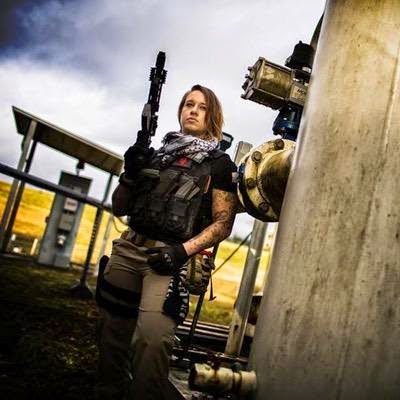Meet the Badass, Tattooed Woman Army Vet Who's Hunting Down Poachers in Africa
Kinessa Johnson is not your average Army veteran.
After a four-year army career, which included combat in Afghanistan, Johnson joined Veterans Empowered to Protect African Wildlife (VETPAW) and headed to Africa to help prevent poaching, a major problem throughout the continent.
The young woman from Washington state is an anti-poaching adviser, training park rangers in East Africa to track and detain poachers, with the aim of avoiding confrontation but preparing the rangers for any potential combat.
"Most of the time anyone that is in a reserve with a weapon is considered a threat and can be shot if rangers feel threatened. Our goal is to prevent trigger-pulling through strategic movements and methods of prevention," Johnson told USA Today. "We work side-by-side with park rangers and it's truly a learning experience for not only park rangers but also our team."
Johnson's campaign to protect these animals has attracted attention through her use of social media. She has posted numerous pictures of herself on the job to her Instagram account,beauty in tragedy.
Organized crime. Not only is poaching bad for biodiversity and the countless animals it affects, but, being a highly lucrative and profitable money source, it fuels organized crime groups in the region.
According to the African Wildlife Foundation, rhino horn is sold for roughly $30,000 per pound (to put that in context, gold is approximately $22,000 per pound) and ivory sells for around $1,000 per pound. Since 1960, the black rhino population has decreased by 97.6% and there are fewer than 900 mountain gorillas on the entire continent.
"Economically, poaching is a short-term solution for communities. Not only does it interfere with ecosystem services — for example, agriculture — but communities could be getting more money in the long run from tourists who come to see live animals. And, of course, it's now funding international terrorism," a Columbia University professor of ecology and evolution told Mic (they asked to remain anonymous for professional reasons).
Gangs and criminals have cultivated the practice of swiftly murdering large numbers of animals, and avoid getting caught by shooting them via helicopter at night, landing only briefly to chainsaw off the desired body parts.
According to the United Nations Environment Programme (UNEP), "Illegal wildlife trade is often carried out by criminal groups operating across borders. They are attracted by high profits and low risks associated with weak governance and lax penalties."
UNEP has therefore stressed the importance of "international cooperation."
Why should we care? The world will pay a price for ignoring this problem, as it only enables rebels and terrorists in a war-torn continent, which has been in desperate need of stability since colonization.
"How shockingly destructive and historically shameful it would be if we did nothing ... where an elephant's dead ivory is prized over its living condition, where corruption feeds on its body and soul, and where money only makes matters worse," Secretary of State John Kerry said at a U.S. Senate Foreign Relations hearing in 2014.
Johnson's initiative is all the more valuable in light of poaching's wider ramifications. She is drawing attention to an issue which has more nefarious and far-reaching implications than most people are aware of. Hopefully, it will make it that much harder for poachers to exploit these animals.
by Natasha Noman
Meet the Badass, Tattooed Woman Army Vet Who's Hunting Down Poachers in Africa
 Reviewed by Rid
on
1:53:00 PM
Rating:
Reviewed by Rid
on
1:53:00 PM
Rating:
 Reviewed by Rid
on
1:53:00 PM
Rating:
Reviewed by Rid
on
1:53:00 PM
Rating:












nice share
ReplyDelete